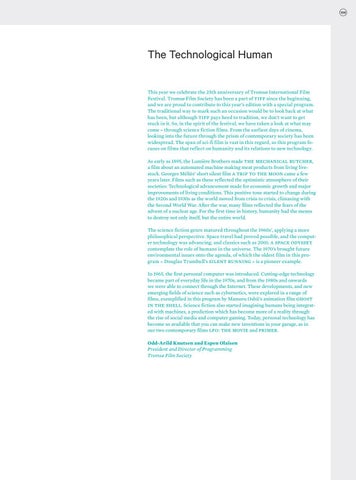109
The Technological Human This year we celebrate the 25th anniversary of Tromsø International Film Festival. Tromsø Film Society has been a part of tiff since the beginning, and we are proud to contribute to this year’s edition with a special program. The traditional way to mark such an occasion would be to look back at what has been, but although tiff pays heed to tradition, we don’t want to get stuck in it. So, in the spirit of the festival, we have taken a look at what may come – through science fiction films. From the earliest days of cinema, looking into the future through the prism of contemporary society has been widespread. The span of sci-fi film is vast in this regard, so this program focuses on films that reflect on humanity and its relations to new technology. As early as 1895, the Lumière Brothers made the mechanical butcher, a film about an automated machine making meat products from living livestock. Georges Méliès’ short silent film a trip to the moon came a few years later. Films such as these reflected the optimistic atmosphere of their societies: Technological advancement made for economic growth and major improvements of living conditions. This positive tone started to change during the 1920s and 1930s as the world moved from crisis to crisis, climaxing with the Second World War. After the war, many films reflected the fears of the advent of a nuclear age. For the first time in history, humanity had the means to destroy not only itself, but the entire world. The science fiction genre matured throughout the 1960s’, applying a more philosophical perspective. Space travel had proved possible, and the computer technology was advancing, and classics such as 2001: a space odyssey contemplate the role of humans in the universe. The 1970’s brought future environmental issues onto the agenda, of which the oldest film in this program – Douglas Trumbull’s silent running – is a pioneer example. In 1965, the first personal computer was introduced. Cutting-edge technology became part of everyday life in the 1970s, and from the 1980s and onwards we were able to connect through the Internet. These developments, and new emerging fields of science such as cybernetics, were explored in a range of films, exemplified in this program by Mamoru Oshii’s animation film ghost in the shell. Science fiction also started imagining humans being integrated with machines, a prediction which has become more of a reality through the rise of social media and computer gaming. Today, personal technology has become so available that you can make new inventions in your garage, as in our two contemporary films lfo: the movie and primer. Odd-Arild Knutsen and Espen Olaisen President and Director of Programming Tromsø Film Society
















